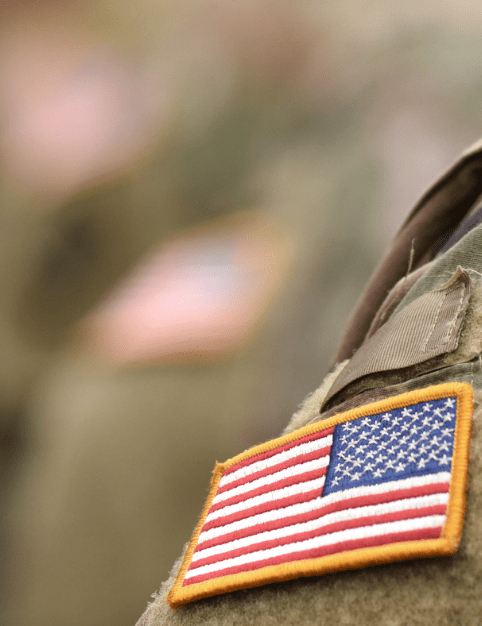Many veterans experience sleep disorders that may be attributable to either their military experience or secondary to another condition that maybe service-connectable. The VA offers service-connected compensation for multiple sleep disturbances which can be awarded on a direct, secondary, or presumptive basis.
Sleep Apnea
Sleep apnea is one of the most common conditions that veterans claim in terms of sleep disturbances and disorders. There are three recognized types of sleep apnea for the VA including:
• Obstructive. Causes the muscles in a person’s throat to close up from time to time and prevent breathing during sleep.
• Central. Impacts the brain’s ability to transmit signals to the throat muscles causing individuals to be unable to breathe within a normal frequency
• Mixed. Combination of both obstructive and central sleep apnea. According to the VA a sleep study must be performed in order to get a medical determination that the veteran is truly suffering from sleep apnea.
Service Connection for Sleep Apnea
Direct Service Connection
Direct service connection for sleep apnea may be granted for veterans who can show that their sleep apnea began in service using service medical records, and by providing a nexus opinion from a medical professional that links their sleep apnea to their military service.
Secondary Service Connection
Secondary service connection may be granted when a veteran’s already service connected condition causes or aggravates an additional condition. Some common service-connected conditions that cause or aggravate sleep apnea include:
• Post-traumatic stress disorder (PTSD)
• Anxiety
• Depression
• Parkinson’s disease
Obesity and Secondary Service Connection for Sleep Disorders
Obesity can be used an intermediary step in establishing secondary service connection for sleep apnea. Veterans who are who are obese tend to have a higher likelihood of developing sleep apnea. The VA’s current rule allows veterans to use obesity, not as its own disability, but as a link between their service-connected condition and sleep apnea.
Veterans can also make a similar argument when it comes to medication that causes weight gain. The veteran can argue that the weight gain, which is linked to their service-connected condition’s medication, caused sleep apnea, which is a secondary service condition.
How the VA Rates Sleep Apnea
Rating Symptoms
0% If it is diagnosed by a sleep test but does not cause any significant symptoms
30% If it causes serious sleepiness during the daytime or not feeling rested after sleeping
50% If it requires the use of breathing machines like a CPAP machine during sleep
100% If the condition continues over a long period of time and causes respiratory failure with right heart ventricle failure or with too much carbon dioxide in the blood streem or if it requires a tracheotomy
Veterans will not receive separate disability ratings for multiple types of sleep condition. Instead, they will only receive a single combined disability rating for the condition that take into account all of their symptoms.
VA Disability for Insomnia
Insomnia is a chronic sleep disorder that involved an inability to fall asleep and/or difficulty staying asleep throughout the night. While it is possible that a veteran’s insomnia began in service, it is common for it to develop later on as a result of another disability.
If the causal condition is already service-connected, then service connection for insomnia may be granted on a secondary basis. Insomnia is commonly associated with psychiatric disorders such as depression, anxiety, and PTSD. Insomnia can also be caused by chronic pain from other disabilities.
Mefloquine and Sleep Disorders
Veterans who served in the Gulf War were often required to take an anti-malarial drug known as Lariam or Mefloquine. Mefloquine was used until 2013 at which point it was discontinued by the Food and Drug Administration.
Mefloquine has been connected to subsequent adverse health effects, including sleep conditions. Veterans must provide evidence (e.g. lay statements) that they took Mefloquine and a medical nexus linking it to their current diagnosed sleep condition.
Presumptive Service Connection for Sleep Disorder
Veterans who served in the Gulf War between August 2, 1990 and the present day may qualify for presumptive service connection. This presumption allows veterans to link their current sleep condition to their service even if they may not have medical evidence linking the two.
This presumption was established in response to the large number of service members coming back from the Gulf War with mysterious illnesses that doctors could not diagnose. Under the Gulf War presumption, if a veteran’s sleep disturbance falls under one of the two following categories, they may be afforded the presumption: (1) medically unexplained chronic multi-symptom illness (MUSCMI) or (2) an undiagnosed illness.
Veterans Help Group have been supporting veterans in getting the benefits they deserve since 1995. If you or a loved one served, and suffer from a sleep disorder we are here to help. Call Veterans Help Group at 855-855-8992 or complete our free veterans benefits case evaluation form.

How to Speed Up Your VA Disability Claim
How to Speed Up Your VA Disability Claim The VA says that in January of 2024, the average time for...

How to Apply for VA Disability Compensation
It's one thing to know how to apply for VA disability compensation. It's another to understand the...

What is the VA DBQ?
What is the VA DBQ? A VA Disability Benefits Questionnaire (DBQ) is a form used to convey...





